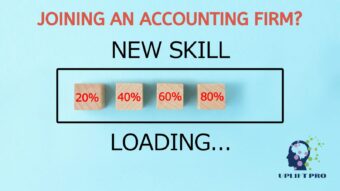Basic Skills Needed to Join an Accounting Firm | Uplift Professionals
By now, we entered the hall of the post-pandemic era, we have learned that to survive and excel in the accounting job market, we need special knowledge and upgraded skill sets with a positive attitude to learning as a continuous process. It is not about just handling the money matters, rather to make yourself future proof against the robotic uprising in the accounting arena of corporate sectors.
Hence, the challenge lies in the transformation from everyday accountant to exceptional accountant as per the demand of the industry. According to Helen Brand, chief executive of the Association of Chartered Certified Accountants (ACCA), “To succeed as a professional accountant…a vastly different set of skills is required than was necessary just 10 short years ago.
And in the next decade, things are likely to change even faster and more dramatically as the global economy continues to evolve at an ever-quickening pace.” Let’s look into the need and required skill sets for new age accountants.
The Entry Level Accounting Jobs
1. Junior accounting associate
2. Staff accountant
3. Tax accountant
4. Audit associate
5. Accounts receivable/accounts payable clerk
Skills Required to be a Successful Accountant
The technological advancement like in other fields have also penetrated the accounting domain and have changed the scenario a lot which have not been foreseen in the past. Taking the above cues, the present-day accountants need to show their proficiency in the following areas.
1. Communication
No doubt at any stage of career including accounting job, this is the basic skill required to bring clarity in explaining different financial situations to co workers and clients with superior clarity.
2. Evaluative Thinking
This is the skill needed to be seen in a successful accountant, the ability to think critically that help in a quick decision-making process in a highly effective manner.
3. Creative Problem-Solving ability
Today’s firms need accountants who can think of a problem outside the box and solve it with outstanding creativity. This is a continuously evolving process, where the accountant has to be embedded to impress the employer as well as to bring more smoothness in the career path.
4. Project Management
Gone are the days when an accounting job was a solo performance by performing the routine assigned jobs. The present-day mantra is team work. Hence, firms are more interested in hiring accountants who have exposure to project management. Nothing to be worried about. If you don’t have the experience, you can grab it from various learning tools/short term courses on the same at your fingertips.
5. Microsoft Excel
One has to have proficiency in using this particular tool in accounting jobs. If you are not comfortable with pivot tables, VLOOKUPs etc. you have to learn it.
6. Data analysis
Today’s accounting needs handling of large accumulation of data with effective analysis and filtering to make it sensible. Accordingly, the present-day employers need their accountants to provide recommendations supported by analyzed final data itself.
7. Cloud-based Accounting Software
In the metamorphosis of everyday accountant to exceptional accountant, you have to be tech savvy as per the need of the hour. In order to cope with such need for real-time financial reporting, many accounting firms have changed over from conventional to the implementation of cloud-based accounting software. This indicates that as a current day accountant, you need to be comfortable working with programs like QuickBooks, Xero, and FreshBooks etc.
The Way to Learn Accounting Skills on Demand
The on job learning process is the best way in this journey and also a time-tested process. However, for a fresher this is not applicable before joining. So, what to do? An internship or entry level job can provide the learning opportunity. Another good alternative is to obtain a good professional accounting credential like US CMA/CPA/EA etc. before or after entering the accounting job arena. Along with the skill development, build your resume accordingly to get the interview call to finally land up into your desired career path.
A Meaningful Resume
1. Show the Pinnacle of your accounting experience
In this part of your resume, incorporate all relevant accounting experiences including internships. You can link your skills to specific duties you performed or use them to explain how you met certain key performance indicators (KPIs) including your familiarity with accounting software if any.
2. Calibrate your Achievements
Use numbers whenever possible to show your success like you can mention the number of team members you have worked with and your achievements or if you have led a team of interns, mention their number and the success achieved with you.
3. The Key Words
This is a very important part of the resume on which we generally don’t pay much attention. Please keep in mind that today’s employers rely on applicant tracking systems (ATS) to help them filter candidates. To be successfully selected by the ATS, it is suggestive of the use of appropriate relevant keywords throughout the resume in an optimized manner.
Summary
It appears obvious that to meet the demand of the present-day accounting firms, the present-day accountants have to be more tech competent with some special skill sets as mentioned above. One of the finest ways to meet the demand is to go for some professional accounting courses like US CMA /CPA/EA etc. which can be pursued along with the conventional academic curriculum or as early as possible after entering the job to extract maximum benefit.
For Further Information/Assistance, Contact:

